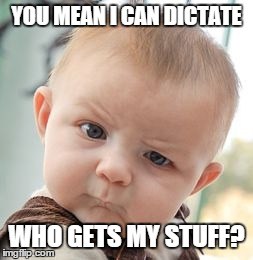Estate planning lawyers eat, sleep, and breathe estate planning and see pretty much every kind of situation unfold. Individuals who have taken the time to create a substantial estate plan nearly always fare better than those who do not. Still, there are a whole lot of myths and misunderstandings floating around that stop people from making the choice to protect their futures with an estate planning lawyer’s assistance.
In order to help as many people as possible, it is incredibly important to tackle these myths head-on and to debunk those that aren’t true.
T or F: Estate plans are just for those with lots of assets.
The answer is false. So many people end up unknowingly damaging their estates and hurting their heirs because they don’t think they have “enough stuff” to justify an estate plan. This myth needs to be debunked! As long as you own something, there will be a legal process to determine what to do with it after you die. This process (probate) is not only long and drawn out, but it also costs money. That money comes from the estate itself, meaning that those precious few assets you wanted to pass on could end up being sold to pay for probate and taxes. Fortunately, working with an estate planning lawyer ahead of time allows you the opportunity to protect your assets using whatever tools are appropriate for your situation.
T or F: You don’t need an estate plan as long as your family knows your wishes.
The answer is false. There are a couple of problems that estate planning lawyers encounter with this line of thinking. First, and probably most importantly, is that just because you and/or your family wants things to happen in a certain way, there’s no guarantee they will. Your loved ones will be forced to follow the state laws even if they don’t match up with your desires. Additionally, everyone experiences grief differently, and though your child or other loved one knows your preferences, he or she may find ways to subvert them for their gain. The best way to avoid both of these kinds of drama is to work with an estate planning lawyer who knows how to ensure that things go the way you want as a matter of law.
T or F: Trust funds are for more than passing on money.
The answer is true. While we may have specific ideas about trust funds as a result of watching too many movies, a whole lot of people aren’t clear on what they can actually do. For example, your estate planning lawyer can help you set up a trust to limit the taxes your estate (and heirs) will have to pay later. They also provide you with a big say in how your heirs can use the money—do you want them to have free rein, to pay for an education, or to give the money to charity? These are just some of the ways trusts are often used.
Even if you don’t have a ton of assets, a skilled estate planning lawyer can help you create a roadmap that will be followed by both the courts and those you’ve left behind. From avoiding probate and excessive taxes to ensuring that your grandkids go to college, working with an estate planning lawyer in your area is the first step in protecting what you hold dear.

 Imagine, one year your child wants a pool party to celebrate their birthday. A day of swimming and playing in the water sounds fun and harmless so you agree. The invites sent, every child in the neighborhood eagerly awaits the party. When the day arrives everything seems to be going according to plan. The children are having a blast in the pool and laughter is abounding. You step inside to grab the cake when you hear a crash and the sound of a child crying. Rushing back outside you find a neighbor boy has slipped on the wet concrete and appears to have injured his arm. Concerned, his parents rush him to the hospital where they discover he broke his arm. Within a week, papers are delivered to your door. The boy’s parents have filed a lawsuit against you and are now suing you for medical expenses.
Imagine, one year your child wants a pool party to celebrate their birthday. A day of swimming and playing in the water sounds fun and harmless so you agree. The invites sent, every child in the neighborhood eagerly awaits the party. When the day arrives everything seems to be going according to plan. The children are having a blast in the pool and laughter is abounding. You step inside to grab the cake when you hear a crash and the sound of a child crying. Rushing back outside you find a neighbor boy has slipped on the wet concrete and appears to have injured his arm. Concerned, his parents rush him to the hospital where they discover he broke his arm. Within a week, papers are delivered to your door. The boy’s parents have filed a lawsuit against you and are now suing you for medical expenses. Heat radiates from the flames spreading across the open field. The firemen rush to contain the fire. It has already consumed much of the landscape in its path. Despite gallons of water dropped on the flames, they continue to grow. The situation continues to go from bad to worse. Miles away a family sits watching the horror unfold on the evening news, a fire burning safely in their fire place. This fire provides warmth and a sense of security. The family watches as finally, the firemen contain the flames but it is too late; the damage done, most of the field is lost.
Heat radiates from the flames spreading across the open field. The firemen rush to contain the fire. It has already consumed much of the landscape in its path. Despite gallons of water dropped on the flames, they continue to grow. The situation continues to go from bad to worse. Miles away a family sits watching the horror unfold on the evening news, a fire burning safely in their fire place. This fire provides warmth and a sense of security. The family watches as finally, the firemen contain the flames but it is too late; the damage done, most of the field is lost. Divorce is never thought about at the beginning of a marriage. However, situations arise that may lead your child to seek a divorce. If that happens you don’t want your child’s inheritance to end up with your son or daughter-in-law. With out the proper planning, that may happen. Without the correct documents prepared appropriately, the gifts you leave your child may end up with their spouse. Developing or designing an Estate Plan where it stays with your child and grandchildren is possible.
Divorce is never thought about at the beginning of a marriage. However, situations arise that may lead your child to seek a divorce. If that happens you don’t want your child’s inheritance to end up with your son or daughter-in-law. With out the proper planning, that may happen. Without the correct documents prepared appropriately, the gifts you leave your child may end up with their spouse. Developing or designing an Estate Plan where it stays with your child and grandchildren is possible. I have a horrible sense of direction. I truly do. When I first learned how to drive I got lost almost every time I went someplace new. I would even look up directions to places only a few blocks away. Then I would print out those directions, and take them with me. I did this because I knew I was terrible at remembering directions. I had to really learn to pay attention. It took a while but eventually my sense of direction improved. I have learned how to identify major streets and follow patterns in different neighborhoods. I still get lost occasionally. However, now I have an easier time finding my way again. Just like how I needed directions for the road some people need directions for their lives.
I have a horrible sense of direction. I truly do. When I first learned how to drive I got lost almost every time I went someplace new. I would even look up directions to places only a few blocks away. Then I would print out those directions, and take them with me. I did this because I knew I was terrible at remembering directions. I had to really learn to pay attention. It took a while but eventually my sense of direction improved. I have learned how to identify major streets and follow patterns in different neighborhoods. I still get lost occasionally. However, now I have an easier time finding my way again. Just like how I needed directions for the road some people need directions for their lives.